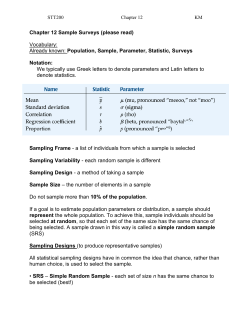
First Nations Launches Education Effort for Native
First Nations Launches Education Effort for Native High School Student-Parents to Help Them Build More Secure, Financially Empowered Lives for Their Children LONGMONT, Colorado (May 5, 2015) – First Nations Development Institute (First Nations), a national Native American nonprofit organization that works to improve Native economies and communities, is launching a new financial education project aimed at Native high school students who are also parents, with the goal that they will become better positioned to achieve secure and financially empowered lives for themselves and their children. The three-phase project, which will run through August 2016, is made possible through a $150,000 grant from the W.K. Kellogg Foundation (WKKF). It will be a school-based financial education project for student-parents at Gallup Central High School in McKinley County, New Mexico. In McKinley County, First Nations has successfully conducted numerous financial education activities for some time. These have included partnering with various local high schools, financial institutions and other organizations to incentivize teenagers to open Youth Savings Accounts; teaching the “Life on Your Terms” financial literacy course based on First Nations’ Building Native Communities: Financial Skills for Families curriculum; commissioning a financial literacy art project; conducting the “Crazy Cash City” experiential learning event; and encouraging schools to participate in the “Stock Market Game,” an online educational activity that introduces students to the financial markets as they learn math, economics and the importance of long-term saving and investing. Gallup Central High is an alternative school that serves a predominantly low-income population of mostly Native American students, many of whom come from families with inter-generational experience with poverty. “Young Native Americans – especially those still in high school who happen to be parents – can be particularly vulnerable in many ways, including when it comes to planning for and providing a financially secure household for themselves and their children,” said Sarah Dewees, First Nations Senior Director of Research, Policy & Asset-Building Programs. “Gallup Central High has done an excellent job creating a supportive environment and offering a range of services for their youth, including teen parents, so it’s a great place as a partner for this effort. We have worked with tribal colleges, too – also with WKKF funding – to do this type of education and support for college student-parents, so we’re excited to expand a version of it to the high school level. The project will involve multi-modal financial education (in classrooms, through workshops and online), of course, but also other aspects such as savings programs for both parents and their children, other asset-building strategies, and even referrals to workforce readiness or training.” About First Nations Development Institute For 35 years, using a three-pronged strategy of educating grassroots practitioners, advocating for systemic change, and capitalizing Indian communities, First Nations has been working to restore Native American control and culturally-compatible stewardship of the assets they own – be they land, human potential, cultural heritage or natural resources – and to establish new assets for ensuring the long-term vitality of Native American communities. First Nations serves Native American communities throughout the United States. For more information, visitwww.firstnations.org. About the W.K. Kellogg Foundation The W.K. Kellogg Foundation (WKKF), founded in 1930 as an independent, private foundation by breakfast cereal pioneer Will Keith Kellogg, is among the largest philanthropic foundations in the United States. Guided by the belief that all children should have an equal opportunity to thrive, WKKF works with communities to create conditions for vulnerable children so they can realize their full potential in school, work and life. The Kellogg Foundation is based in Battle Creek, Michigan, and works throughout the United States and internationally, as well as with sovereign tribes. Special emphasis is paid to priority places where there are high concentrations of poverty and where children face significant barriers to success. WKKF priority places in the U.S. are in Michigan, Mississippi, New Mexico and New Orleans; and internationally in Mexico and Haiti. For more information, visit www.wkkf.org. --##-Program Contact: Sarah Dewees, First Nations Senior Director of Research, Policy & Asset-Building Programs sdewees@firstnations.org or (540) 371-5615 Media Contact: Randy Blauvelt, First Nations Senior Communications Officer rblauvelt@firstnations.org or (303) 774-7836 x213
© Copyright 2025









